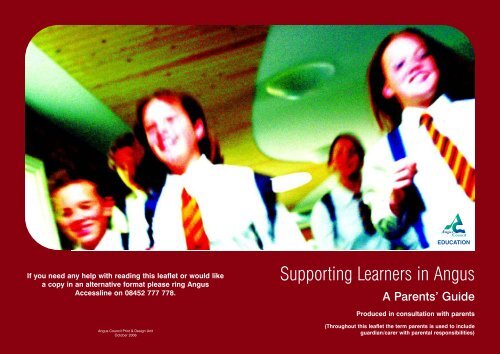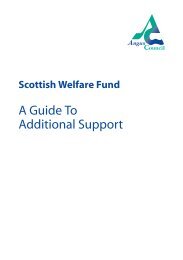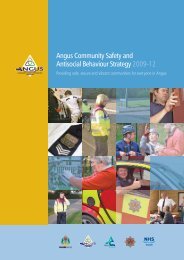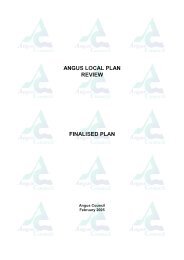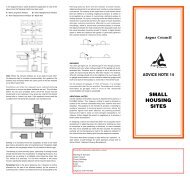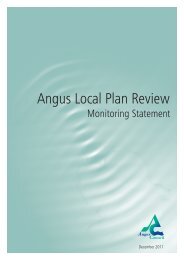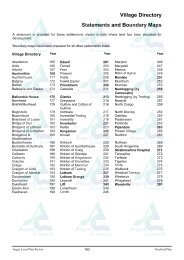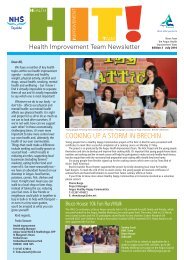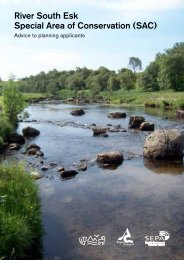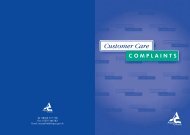Support for Learning Booklet - a Parents' Guide - Angus Council
Support for Learning Booklet - a Parents' Guide - Angus Council
Support for Learning Booklet - a Parents' Guide - Angus Council
You also want an ePaper? Increase the reach of your titles
YUMPU automatically turns print PDFs into web optimized ePapers that Google loves.
EDUCATION<br />
If you need any help with reading this leaflet or would like<br />
a copy in an alternative <strong>for</strong>mat please ring <strong>Angus</strong><br />
Accessline on 08452 777 778.<br />
<strong>Support</strong>ing Learners in <strong>Angus</strong><br />
A Parents’ <strong>Guide</strong><br />
Produced in consultation with parents<br />
<strong>Angus</strong> <strong>Council</strong> Print & Design Unit<br />
October 2006<br />
(Throughout this leaflet the term parents is used to include<br />
guardian/carer with parental responsibilities)
Contents<br />
1. Introduction<br />
2. What are Additional <strong>Support</strong> Needs<br />
3. Assessing Additional <strong>Support</strong> Needs<br />
4. Meeting Additional <strong>Support</strong> Needs<br />
5. Individualised Educational Programmes and Co-ordinated<br />
<strong>Support</strong> Plans<br />
6. Frequently Asked Questions About Assessment<br />
7. Choosing Where Your Child will be Educated<br />
8. Moving on<br />
9. <strong>Support</strong>ing Children and Families<br />
10. Finding Solutions and Resolving Differences<br />
11. Useful Contacts and Further Sources of In<strong>for</strong>mation<br />
12. Glossary<br />
NB: in this guide the following terms apply:<br />
• Parent - includes guardian/carer with parental responsibilities<br />
• Child (pre-school) - 3 to 5 years<br />
• Child (school age) - 5 to 16 years<br />
• Young person - over 16 but not yet 18 years<br />
1
1. Introduction<br />
In November, 2005 the Education (Additional <strong>Support</strong> <strong>for</strong> <strong>Learning</strong>)<br />
(Scotland) Act 2004 came into <strong>for</strong>ce with the aim of creating a stronger,<br />
better system <strong>for</strong> supporting children’s learning. The Act gives new rights<br />
to parents and ensures that the views of children are sought and taken<br />
into account when their needs are being considered.<br />
The Act introduces a single system <strong>for</strong> meeting the needs of children who<br />
require additional support to ensure that they can make the most of their<br />
education. It requires schools and other agencies to work in partnership to<br />
make a real difference to the lives of children with additional support<br />
needs.<br />
Any child who needs more or different support to what is normally<br />
provided is said to have Additional <strong>Support</strong> Needs (ASN).<br />
A Code of Practice, called <strong>Support</strong>ing Children’s <strong>Learning</strong>, sets out<br />
detailed guidance on how the Act should be implemented.<br />
The <strong>Angus</strong> <strong>Support</strong> <strong>for</strong> Learners Policy was revised (October 2006) to<br />
provide guidance on how the Code of Practice will be implemented locally.<br />
This Parent’s <strong>Guide</strong> provides links to the <strong>Angus</strong> policy which is available<br />
online at: www.angus.gov.uk/sflpolicy.<br />
The Code of Practice is available online at:<br />
http://www.scotland.gov.uk/Resource/Doc/57346/0016754.pdf<br />
The Education (Additional <strong>Support</strong> <strong>for</strong> <strong>Learning</strong>) (Scotland) Act 2004 is<br />
available online at: http://www.scotlandlegislation.hmso.gov.uk/legislation/scotland/acts2004/2004004.htm<br />
<strong>Angus</strong> <strong>Council</strong> is committed to providing a high quality education <strong>for</strong> all<br />
pupils by<br />
• providing a setting in which they feel valued and safe<br />
• ensuring they are given the opportunity to realise their full potential;<br />
and,<br />
• supporting them, including pupils with Additional <strong>Support</strong> Needs, in as<br />
local a setting as possible.<br />
SFL Policy section 1<br />
2
2. What Are Additional <strong>Support</strong> Needs<br />
All learners need support to help them learn. Through good quality<br />
teaching and a suitable curriculum, most are able to make progress<br />
without the need <strong>for</strong> any additional support.<br />
However, some children and young people will require support which is<br />
different from what is normally provided in the classroom. In other words,<br />
they need additional support.<br />
The following are some examples of situations which may mean that a<br />
child needs some additional support in school. These examples are only a<br />
guide because every child is different and it is not possible to list all of the<br />
reasons why additional support might be needed. Circumstances which<br />
disrupt one pupil’s learning may have little or no effect on the learning of<br />
another. One child’s additional support needs could last <strong>for</strong> just a few<br />
weeks while another’s may last <strong>for</strong> years.<br />
Factors which might mean additional support is needed could include:-<br />
• <strong>Learning</strong> environment – what is being taught, or the way in which it is<br />
being taught, may not be suitable <strong>for</strong> an individual child<br />
• Family circumstances – family breakdown, homelessness, or<br />
becoming looked after may have an effect on a child‘s ability to learn<br />
• Disability or health needs – sight or hearing difficulties, mental or<br />
physical health problems, learning or attention difficulties can all affect<br />
how well a child learns<br />
• Social and emotional factors – bereavement, bullying, behavioural<br />
difficulties or experiencing racial discrimination could mean that a child<br />
needs additional support.<br />
Circumstances like these can and do also affect children under five. In<br />
some cases, additional support is provided by the Education Department<br />
to children under three who have a disability.<br />
There are no special schools in <strong>Angus</strong>. Children with additional support<br />
needs are educated in their local school wherever possible but some <strong>Angus</strong><br />
schools are able to offer more specialised support <strong>for</strong> pupils – particularly<br />
pupils who have physical disabilities and/or sensory impairments.<br />
In <strong>Angus</strong> these schools are called Resourced Schools.<br />
SFL Policy sections 4.2 & 4.14<br />
3
3. Assessing Additional <strong>Support</strong> Needs<br />
Assessment helps to identify whether a child or young person has<br />
additional support needs and also helps to determine what kind of support<br />
is needed.<br />
While “assessment” sounds very <strong>for</strong>mal, pupils’ needs are constantly<br />
being assessed through their daily contact with pre-school staff, class and<br />
subject teachers. In most cases the needs identified are met in the<br />
classroom, with the support of parents at home.<br />
If assessment reveals a need <strong>for</strong> additional support, this may be provided<br />
by the school’s Additional <strong>Support</strong> Needs (ASN) staff or by other services<br />
within the Education Department such as the Educational Psychology<br />
Service or the School and Family <strong>Support</strong> Service.<br />
Where a child’s needs are complex, specialists may carry out more <strong>for</strong>mal<br />
assessments. Other agencies may also be involved, <strong>for</strong> example the<br />
Health Service, the Social Work Department or organisations in the<br />
Voluntary Sector.<br />
Parents have the right to ask <strong>Angus</strong> <strong>Council</strong> to arrange an assessment to<br />
find out if their child has additional support needs. Young people (pupils<br />
over the age of 16) can also request an assessment in their own right.<br />
The Education Service is under a duty to respond to such requests and<br />
must comply unless the request is considered unreasonable.<br />
SFL Policy sections 4.5, 4.6 & 4.10<br />
4
4. Meeting Additional <strong>Support</strong> Needs<br />
The <strong>Angus</strong> <strong>Support</strong> <strong>for</strong> Learners Policy describes in detail how<br />
additional support needs are identified and addressed. Five key stages set<br />
out, in sequence, what is to be done and by whom to meet a pupil’s<br />
needs. Assessment and support is always put in place in a way which is<br />
designed to cause the least disruption to the pupil’s learning experiences<br />
and development.<br />
The five Key Stages are:-<br />
Stage 1<br />
All pupils have their educational needs identified and met in<br />
the classroom by their teacher. Pupils and parents are involved<br />
in this process all the time and it is the everyday business of<br />
the school. The overwhelming majority of children will not<br />
move beyond this stage.<br />
Stage 2<br />
Some pupils need additional support. This will usually be<br />
provided by the school’s ASN staff. Other pupils may need<br />
support from people like the School’s Educational<br />
Psychologist, the school doctor or nurse, or a Social Worker.<br />
An Individualised Educational Programme (IEP) may be used<br />
to set learning targets. Progress on the IEP is reviewed<br />
regularly – at least once every term.<br />
(More in<strong>for</strong>mation on IEPs is contained in Section 5 of this<br />
guide).<br />
Stage 3<br />
If the support provided by Stage 2 intervention is not sufficient,<br />
partners, including parents and pupil, will be invited to a Stage<br />
3 Case Conference. This meeting will review the support<br />
already offered and following discussion will plan how further<br />
additional support can be provided. There will be regular<br />
follow-up meetings to review progress. If the support is<br />
successful and meets the needs of the child there may be no<br />
need <strong>for</strong> further meetings. Ongoing needs will be met by Stage<br />
2 support.<br />
Partners invited to these meetings will be drawn from a range<br />
5
of agencies which may be able to offer support,<br />
such as Community Child Health or the Social Work<br />
Department. Meetings will normally be held in the school<br />
and chaired by a senior member of the school staff.<br />
If your child has a complex need (that is, one likely to have a<br />
significant effect on their school education), or several different<br />
needs (multiple needs), expected to last <strong>for</strong> more than a year<br />
and likely to need significant additional support from the<br />
education authority and at least one other partner agency, a<br />
Co-ordinated <strong>Support</strong> Plan (CSP) may be considered at this<br />
meeting.<br />
(More in<strong>for</strong>mation on CSPs is contained in Section 5 of this<br />
document).<br />
Stage 4<br />
If the support put in place at Stage 3 does not fully meet a<br />
pupil’s needs, they may be referred to a Stage 4 Conference.<br />
At this stage, senior managers from the Education Department<br />
meet with colleagues from the Social Work & Health<br />
Department and perhaps from NHS Tayside. They review the<br />
decisions of the Stage 3 Case Conference(s) and consider<br />
other <strong>Angus</strong>-based support such as an alternative package of<br />
care and/or education. Further assessments can also be<br />
requested at this stage.<br />
Requests <strong>for</strong> Co-ordinated <strong>Support</strong> Plans made by any of the<br />
Stage 3 partners are considered at this stage.<br />
All decisions made at Stage 4 are regularly reviewed.<br />
Stage 5<br />
In exceptional cases, an individual pupil may need support<br />
from specialist resources, including a school or care placement<br />
outwith <strong>Angus</strong>. Senior managers from the Education and<br />
Social Work & Health Departments and from NHS Tayside<br />
meet at this stage and decide on the suitability of such<br />
provision.<br />
Pupils at Stage 5 will already have a CSP prepared.<br />
SFL Policy sections 4.3, 4.4, 4.5, 4.6 & 4.10<br />
6
5. Individualised Educational Programmes<br />
& Co-ordinated <strong>Support</strong> Plans<br />
As described earlier, some pupils need a level of support which is greater<br />
than, or different from, that which is normally provided in the classroom.<br />
This is what is meant by saying that a pupil has additional support needs.<br />
More detailed planning of their educational programme may be helpful.<br />
Opening an Individualised Educational Programme (IEP) is one way to<br />
put into place a detailed planning and review process.<br />
An IEP is an educational planning document which describes in detail the<br />
nature of a pupil’s additional support needs and identifies the type of<br />
support which is required. The IEP sets out both long and short-term<br />
targets to meet the pupil’s needs. Parents have an important part to play<br />
in setting the IEP targets and monitoring progress.<br />
A very small number of pupils (probably less than one per cent of the<br />
school population) require a Co-ordinated <strong>Support</strong> Plan (CSP) to<br />
organise their support.<br />
A pupil requires a CSP to manage the provision of additional support if:<br />
• they have a need which is complex (likely to have a significant<br />
adverse effect on his or her school education); or<br />
• they have many different needs (multiple)<br />
and their need(s):<br />
• is/are likely to last <strong>for</strong> more than a year<br />
• require significant additional support from the education authority<br />
• also require significant additional support from at least one other<br />
partner agency.<br />
This level of support need is sometimes referred to as “having enduring,<br />
complex or multiple barriers to learning which require a range of additional<br />
support from different services”. Another measure often used when<br />
professionals discuss opening a CSP is whether the support provided by<br />
partner agencies is “direct, continuing and substantial.”<br />
7
A parent or young person has the right to ask the education<br />
authority to establish if a Co-ordinated <strong>Support</strong> Plan is required.<br />
Requests should be made in writing, or electronically, to the<br />
Director of Education, <strong>Angus</strong> <strong>Council</strong> Education Department, Forfar.<br />
A CSP plans long-term and strategically. It contains a description of a<br />
pupil’s additional support needs and details of how these needs affect<br />
their ability to learn. It describes the type of support that is required and<br />
states who will provide this, <strong>for</strong> example Speech and Language Therapist,<br />
other Health Service practitioner or Social Worker. The views of everyone<br />
involved, and this includes the pupil and their parents, are written down in<br />
the CSP, together with the name of the person appointed by the Education<br />
Service to be responsible <strong>for</strong> co-ordinating the plan (the Co-ordinator).<br />
It should take no more than 16 weeks to prepare a CSP, unless there are<br />
exceptional delays in arranging <strong>for</strong> specific types of assessment to be<br />
carried out. School holiday periods may also have an effect on how long it<br />
takes to complete the process.<br />
The CSP will be reviewed every 12 months. However, an early review may<br />
be prompted by a significant change to a child’s circumstances.<br />
If there is disagreement about any aspect of a CSP, mediation can be<br />
arranged, or a reference to the Additional <strong>Support</strong> Needs Tribunal can be<br />
made by the parent or young person. (See also Section 10)<br />
More in<strong>for</strong>mation about CSPs is available on the Enquire website<br />
mentioned above at<br />
http://www.enquire.org.uk/enquire/publications.html.<br />
SFL Policy sections 4.1, 4.17 & 4.18<br />
8
6. Frequently asked questions about<br />
assessment<br />
Who can request an assessment<br />
• the Education Department<br />
• a parent<br />
• a young person over the age of 16.<br />
How should a request <strong>for</strong> assessment be made<br />
• any request <strong>for</strong> an assessment should be made in writing, or<br />
electronically to the Director of Education<br />
• the request must say what type of assessment is required and why.<br />
Parents can make arrangements <strong>for</strong> a private assessment to be carried out<br />
and the Education Department will take the report of this assessment into<br />
account when considering a pupil’s needs.<br />
If you would like more in<strong>for</strong>mation about how to request an assessment<br />
please contact:<br />
Frances Watt, Administrative Assistant - Additional <strong>Support</strong> Needs,<br />
Education Department, Forfar.<br />
WattF@angus.gov.uk Tel: 08452 777 778<br />
What will happen next<br />
• once a request <strong>for</strong> assessment has been received, the Education<br />
Department will reply to you within 4 weeks<br />
• if your request is agreed, arrangements will be made <strong>for</strong><br />
assessment(s) to be carried out<br />
• if the Education Department considers your request is unreasonable it will<br />
be refused, but the reasons <strong>for</strong> the refusal will be given to you in writing.<br />
How can an appeal be made if a request <strong>for</strong> assessment is<br />
refused<br />
• there is a free mediation service available<br />
• there is also access to a dispute resolution process.<br />
More in<strong>for</strong>mation about the dispute resolution process can also be found<br />
at www.asntscotland.gov.uk.<br />
SFL Policy sections 4.5, 4.6, 4.19 & 4.20<br />
9
7. Choosing Where Your Child will be<br />
Educated<br />
Pupils usually attend their local school but <strong>for</strong> those who need more<br />
specialist support there is the possibility of attending a different <strong>Angus</strong><br />
school (usually a Resourced school, see Section 2), where different<br />
provision, such as extra or specialist teaching support or a smaller group<br />
setting, can be made available.<br />
About six months be<strong>for</strong>e a child with known additional support needs<br />
reaches school age, the Education Service usually proposes to parents a<br />
school placement which will be best suited to meeting the child’s<br />
anticipated educational needs. If the child’s local primary school is able to<br />
offer appropriate provision, a place in that school will be offered as a first<br />
choice. If, however, it is unlikely that all their educational needs can be met<br />
there, the Education Department will propose an alternative placement.<br />
Staff will take your own views into account and provide you with<br />
in<strong>for</strong>mation about how to make a request <strong>for</strong> a school of your own<br />
choosing.<br />
Similar arrangements apply when pupils with additional support needs<br />
transfer from primary to secondary school. A review process is begun,<br />
during Primary 6, in which parents and professional colleagues involved<br />
with the pupils will be invited to take part, as will the pupils themselves<br />
whenever this is appropriate. During this year the Education Department<br />
will propose a secondary school placement to parents. Because all <strong>Angus</strong><br />
secondary schools can now offer more support within a safe environment<br />
than was possible even a few years ago, <strong>for</strong> the overwhelming majority of<br />
<strong>Angus</strong> pupils the first placement proposal will be their local mainstream<br />
secondary school. However, if a review suggests this would not be<br />
suitable, or if parents wish to request a different school, that initial<br />
proposal will be considered again.<br />
A very small number of children need specialised support which is only<br />
available at a school outside <strong>Angus</strong>. In some cases the Education<br />
Department works with parents and professional colleagues about<br />
arrangements <strong>for</strong> pupils to access this type of support<br />
(See also references to the Five Stage Process in Section 4)<br />
10
Placing Requests<br />
Where parents wish a child to attend a different school from<br />
that proposed by the Education Department, they must make<br />
a Placing Request.<br />
Placing Request <strong>for</strong>ms are available from any school or any <strong>Council</strong><br />
Access office in <strong>Angus</strong>.<br />
The Education Department may refuse a Placing Request under certain<br />
circumstances but parents are in<strong>for</strong>med in writing the reason(s) <strong>for</strong> refusal<br />
and about their right of appeal.<br />
More details about Placing Requests can be found in the Scottish<br />
Executive leaflet Choosing a School - a <strong>Guide</strong> <strong>for</strong> Parents which can be<br />
requested from the Education Department or through the <strong>Angus</strong><br />
ACCESSLine 08452 777 778, and which is also available on-line at<br />
www.scotland.gov.uk<br />
SFL Policy sections 4.6, 4.9 & 4.14<br />
11
8. Moving On<br />
All children and young people go through a number of important<br />
changes (transitions) during the course of their education – starting preschool,<br />
beginning primary school, moving on to secondary school and<br />
leaving school <strong>for</strong> the adult world.<br />
Some pupils also experience a change of school if their family moves to a<br />
new area.<br />
The Education Department will try to make sure that these changes are<br />
managed as smoothly as possible. This is the case <strong>for</strong> all pupils, but of<br />
course particularly when the pupil involved has additional support needs.<br />
Be<strong>for</strong>e each transition the Education Department gathers in<strong>for</strong>mation<br />
about the pupil’s support needs and makes sure that this is taken into<br />
account in planning the next step. In the case of pupils leaving school at<br />
sixteen or over, this in<strong>for</strong>mation can be shared with agencies or services<br />
who will support the pupil during transition or post-school. However,<br />
in<strong>for</strong>mation will only be shared with the agreement of parents or, where<br />
appropriate, the pupil.<br />
As described above (Section 7), the process of transferring in<strong>for</strong>mation will<br />
begin at least six months be<strong>for</strong>e a child moves from pre-school to primary<br />
school, and at least twelve months be<strong>for</strong>e the move to secondary or to<br />
post-school.<br />
Parents and pupils are consulted and involved at each stage of transition<br />
planning.<br />
SFL Policy section 4.9<br />
12
9. <strong>Support</strong>ing Children and Families<br />
The Education Department recognises the importance of working<br />
in partnership with parents and actively encourages them to support their<br />
children’s learning.<br />
Children and young people are encouraged and enabled to express their<br />
views and opinions and to take part in discussions and decision-making<br />
whenever it is appropriate.<br />
Parents can make decisions on behalf of their child until they are 16 years<br />
old and can speak or act <strong>for</strong> their child in situations where it would be<br />
difficult or impossible <strong>for</strong> the child to express their views.<br />
Parents and young people have the right to have a supporter or advocate<br />
present in any meetings where their additional support needs are being<br />
discussed.<br />
A supporter can be anyone the parent or young person nominates (some<br />
exceptions are detailed in the <strong>Support</strong> <strong>for</strong> Learners Policy) who can assist<br />
the parent or young person be<strong>for</strong>e and during meetings by, <strong>for</strong> example,<br />
helping them to express their views, asking questions <strong>for</strong> them, or offering<br />
them advice.<br />
An advocate is also someone who can support a parent or young person<br />
by speaking on their behalf and representing them at meetings. More<br />
explanation about the roles of supporter and advocate can be found in the<br />
Enquire Parents’ <strong>Guide</strong> to Additional <strong>Support</strong> <strong>for</strong> <strong>Learning</strong>, (see reference<br />
below).<br />
SFL Policy section 4.19<br />
13
10. Finding Solutions and Resolving<br />
Differences<br />
The Education Department’s policy is to work in partnership with parents,<br />
pupils and young people, and it aims to make it possible <strong>for</strong><br />
disagreements or differences of opinion to be resolved amicably at an<br />
early stage.<br />
When concerns arise, the first point of contact should always be with the<br />
Head Teacher of the school.<br />
Sometimes, however, help may be needed to resolve disagreements and<br />
in such situations a free Mediation Service is available to <strong>Angus</strong> parents<br />
and young people. The mediation process involves an independent,<br />
trained mediator who will help resolve differences and find a solution<br />
acceptable to both parties. In <strong>Angus</strong> this service is provided by Parent to<br />
Parent, an independent, voluntary organisation which is based in Dundee.<br />
A supporter or advocate can again attend mediation meetings in order to<br />
support parents and pupils.<br />
If agreement still cannot be reached, or if the parent or young person feels<br />
mediation would be inappropriate, disagreement about issues related to<br />
Additional <strong>Support</strong> Needs can be referred directly to either the Dispute<br />
Resolution Service or the Additional <strong>Support</strong> Needs Tribunal, although the<br />
Additional <strong>Support</strong> Needs Tribunal deals only with matters related to Coordinated<br />
<strong>Support</strong> Plans.<br />
For advice on how to access Mediation Services, Dispute Resolution or<br />
the Additional <strong>Support</strong> Needs Tribunal please contact Frances Watt.<br />
SFL Policy sections 4.20<br />
14
11. Contacts and Further In<strong>for</strong>mation:<br />
Contacts<br />
• The Director of Education<br />
<strong>Angus</strong> <strong>Council</strong><br />
Education Department<br />
Forfar Telephone 08452 777 778<br />
• Frances Watt<br />
<strong>Angus</strong> <strong>Council</strong><br />
Education Department<br />
Forfar Telephone 08452 777 778<br />
• Enquire Helpline - <strong>for</strong> advice and in<strong>for</strong>mation about the Act<br />
Further In<strong>for</strong>mation<br />
• The Parent’s <strong>Guide</strong> to Additional <strong>Support</strong> <strong>for</strong> <strong>Learning</strong><br />
Telephone: 0845 123 2303<br />
Textphone: 0131 22 22 439<br />
E-mail: info@enquire.org.uk<br />
Published by ENQUIRE – The Scottish Advice Centre <strong>for</strong> Additional <strong>Support</strong><br />
<strong>for</strong> <strong>Learning</strong> available online at:<br />
http://www.enquire.org.uk/enquire/pdf/parents-guide-to-asl-2006-01.pdf<br />
Copies can also be requested by telephone - Tel: 0845 123 23 03<br />
12. Glossary - Additional <strong>Support</strong> Needs<br />
Additional <strong>Support</strong> Needs<br />
a child or young person has additional support needs if he or she is, or is likely<br />
to be, unable to benefit from school education without additional support.<br />
Additional <strong>Support</strong> Needs Tribunal<br />
a hearing which provides independent and expert adjudication on<br />
disagreements about Co-ordinated <strong>Support</strong> Plans<br />
Advocate<br />
a person who can support a parent or young person by speaking on their<br />
behalf and representing them at meetings.<br />
Appropriate Agencies<br />
other agencies which have a legal obligation to help education authorities<br />
carry out their duties under the ASL Act. These include Social Work, Health<br />
Board, other local authorities, Careers Scotland, colleges and universities.<br />
15
Co-ordinated <strong>Support</strong> Plan (CSP)<br />
a planning document <strong>for</strong> pupils with long-lasting complex or multiple<br />
barriers to learning who require a range of additional support from other<br />
services outwith education. It describes the pupil’s needs and how these needs<br />
affect his or her ability to learn. It describes the type of support that is needed<br />
and states who will provide this support. The CSP must be reviewed every 12<br />
months or earlier if there is significant change in a child’s circumstances.<br />
Educational Psychologist<br />
a chartered psychologist specialising in education. He or she can give advice<br />
about additional support needs to parents, schools, the Education Authority,<br />
other agencies such as the Careers Service, and may contribute directly to<br />
assessments.<br />
Individualised Educational Programme (IEP)<br />
a document which describes in detail the nature of a pupil’s additional support<br />
needs and identifies the type of support that is required. Targets are set and<br />
the pupil’s progress is reviewed regularly.<br />
Mediation<br />
a free service provided to help resolve difficulties relating to additional<br />
support needs at an early stage. A trained mediator will help both parties to<br />
reach an agreement on how to resolve an issue but the mediator will not offer<br />
advice nor make recommendations.<br />
Other Agencies<br />
a number of other agencies, such as voluntary organisations, may help<br />
support a child or young person’s learning but do not have a legal obligation<br />
to do so, unlike Appropriate Agencies such as Health or Social Work who<br />
must provide support unless this is in conflict with other duties.<br />
Staged Intervention<br />
a sequence of steps <strong>for</strong> identifying additional support needs and finding ways<br />
of meeting these needs in an appropriate way.<br />
<strong>Support</strong>er<br />
a supporter can be anyone the parent or young person nominates (minor<br />
exceptions are set out in the <strong>Support</strong> <strong>for</strong> Learners Policy) and may assist the<br />
parent or young person be<strong>for</strong>e and at meetings by, <strong>for</strong> example, helping them<br />
to express their views , asking questions on their behalf or offering them advice.<br />
Additional <strong>Support</strong> Needs Specialists<br />
teachers who advise other members of staff on the range of teaching<br />
methods, strategies and resources available to meet the additional needs of<br />
learners. An ASN teacher might work in the classroom with the class teacher,<br />
provide individual support or teach small groups of pupils.<br />
Transitions<br />
these are the stages that children and young people go through in the course<br />
of their education. They include starting nursery, entering primary school,<br />
moving on to secondary school and leaving school.<br />
16


